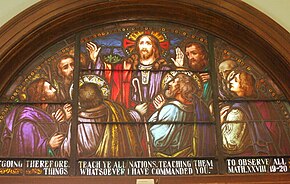This article has multiple issues. Please help improve it or discuss these issues on the talk page. (Learn how and when to remove these messages)
|


| Events in the |
| Life of Jesus according to the canonical gospels |
|---|
 |
| Early life |
| Ministry |
| Passion |
| Resurrection |
| In rest of the NT |
|
Portals: |
In Christianity, the Great Commission is the instruction of the resurrected Jesus Christ to his disciples to spread the gospel to all the nations of the world. The Great Commission is outlined in Matthew 28:16–20, where on a mountain in Galilee Jesus calls on his followers to make disciples of and baptize all nations in the name of the Father, the Son, and the Holy Spirit.
The Great Commission is similar to the episodes of the commissioning of the Twelve Apostles found in the other Synoptic Gospels, though with significant differences. Luke also has Jesus during his ministry dispatching disciples, including the seventy disciples, sending them to all the nations and giving them power over demons. The dispersion of the Apostles in the traditional ending of Mark is thought to be a 2nd-century summary based on Matthew and Luke.
The Great Commission has become a tenet in Christian theology emphasizing ministry, missionary work, evangelism, and baptism. The apostles are said to have dispersed from Jerusalem and founded the apostolic sees, such as those at Corinth, Philippi, Ephesus, and Rome (see also Holy See). Preterists believe that the Great Commission and other Bible prophecies were fulfilled in the 1st century while futurists believe Bible prophecy has yet to be fulfilled at the Second Coming.
History
It is not known who coined the term Great Commission, though it may have been Justinian von Welz and it was later popularized by Hudson Taylor.
New Testament accounts
The following comparison table is primarily based on the King James Bible (KJV) English translation of the New Testament.
| Matthew 28:16–20 | Mark 16:14–18 | Luke 24:44–49 | John 20:19–23 | Acts 1:4–8 |
|---|---|---|---|---|
|
|
|
|
|
Interpretations
The commission from Jesus has been interpreted by all evangelical Christians as meaning that his followers have the duty to go, make disciples, teach, and baptize. Although the command was initially given directly only to Christ's eleven Apostles, evangelical Christian theology has typically interpreted the commission as a directive to all Christians of every time and place, particularly because it seems to be a restatement or moving forward of the last part of God's covenant with Abraham in Genesis 12:3.
Full Preterists believe that the Great Commission was already fulfilled based on the New Testament passages "And they went out and preached everywhere" (Mark 16:20), "the gospel that you have heard, which was proclaimed in all creation under heaven" (Colossians 1:23), and "Now to Him who is able to establish you according to my gospel and the preaching of Jesus Christ, according to the revelation of the mystery which has been kept secret for long ages past, but now is manifested, and by the scriptures of the prophets, according to the commandment of the eternal God, has been made known to all the nations" (Romans 16:25–26).
See also
- Ad gentes
- Evangelii gaudium
- Evangelii nuntiandi
- Evangelism
- Matthew 28:16, 17, 18, 19, 20
- New evangelization
- Overview of resurrection appearances in the Gospels and Paul
- Redemptoris Missio
References
- Castleman, Robbie F. "The Last Word: The Great Commission: Ecclesiology" (PDF). Themelios. 32 (3): 68. Archived from the original (PDF) on 3 March 2016. Retrieved 28 October 2014.
- Castleman, Robbie F. "The Last Word: The Great Commission: Ecclesiology" (PDF). Themelios. 32 (3): 68. Archived from the original (PDF) on 3 March 2016. Retrieved 28 October 2014.
- "Online Bible – King James Version". Biblehub.com. 2011. Retrieved 30 October 2022.
- "Evangelicals and Evangelicalism". crcc.usc.edu. Retrieved 4 November 2024.
- "The Evangelical Manifesto | Os Guinness". Os Guinness | A quiet voice on behalf of faith, freedom, truth, reason and civility. 2 February 2016. Retrieved 4 November 2024.
| Twelve Apostles of Jesus | |
|---|---|
| Apostles | |
| Later | |
| Related | |
| Jesus | |
|---|---|
| Chronology of Jesus's life |
|
| New Testament | |
| Historicity | |
| Depictions | |
| Christianity | |
| In other faiths | |
| Family |
|
| Related | |
| Gospel of Matthew | |||||
|---|---|---|---|---|---|
| Bible (New Testament) |
| ||||
| Events and phrases |
| ||||
| People | |||||
| Places | |||||
| Related | |||||
| In culture |
| ||||
| Manuscripts | |||||
| Sources | |||||
| Christianity | |||||||||
|---|---|---|---|---|---|---|---|---|---|
| Bible (Scriptures) | |||||||||
| Foundations | |||||||||
| History (timeline) (spread) |
| ||||||||
| Denominations (list, members) |
| ||||||||
| Theology | |||||||||
| Philosophy | |||||||||
| Other features |
| ||||||||